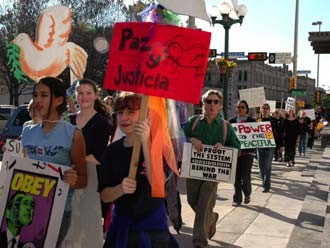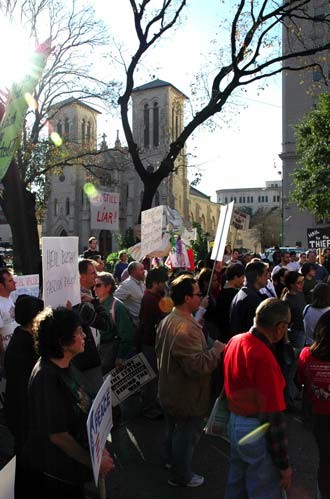|
Two San Antonio women return from the inaugural protests with a lot on their mind The Sunday after President Bush's inauguration, conservative pundit Robert Novak, who last year outed CIA operative Valerie Plume in his syndicated newspaper column, complained on CNN's Capitol Gang that he is "tired of the protesters." "They're punks," Novak added, referring to the thousands of demonstrators who converged on Washington, D.C. on January 20 to oppose Bush's swearing-in. "This is none of their business; it's hooliganism." Although one could argue that the President of the United States is everyone's business, Novak's comments speak to the continued characterization of protesters as traitors, as well as the deepening political divide in America. Two San Antonio women, Marisa Hernandez and Jennifer Brown, traveled to the nation's capital to join more than 10,000 people who protested the inauguration. Twelve hours after returning to San Antonio, Hernandez and Brown, co-founders of the feminist publication Xika, carried an adrenalized sense of purpose, but their experiences in D.C. also compelled them to re-examine their opinions about democracy, tolerance, and societal change. America's political polarity was embodied at the inaugural parade, for which the National Park Service dedicated a space for demonstrators for the first time. Protesters lined one side of Pennsylvania Avenue; Bush supporters and other bystanders were on the other. It was as if the red and blue states were staring each other down. "People are being put into such opposition on a community level," said Brown, a 29-year-old UTSA graduate. "That opposition is one of the powerful tools of this administration." Brown and Hernandez brandished a sign that read "Texas feminists impeach Bush," other protesters waved a Haitian flag, and several Christians carried placards proclaiming "Jesus loves the kids of Iraq," while another man, who the women said appeared to be a Bush supporter, raised his wallet, shaking it in the air.
En route to a checkpoint located at a highway underpass, Bush supporters and opponents mingled for a peaceful, yet tense, three hours. "There were people behind us saying really hateful things, like 'Oh, he's probably gay,'" recalled Brown. "But that made me feel OK about not hating them. Although I don't think I'm better than them, I feel sorry for them." Televised news reports showed police pepper-spraying several protesters near a barricade; at least 11 people had been arrested by nightfall for a variety of alleged offenses. But Brown and Hernandez said that demonstrators - and police - in their area were non-violent. When the Bush motorcade approached, police in riot gear converged on the demonstration area, but after it passed, they dispersed. "The whole thing was surreal," added Brown. "People were flipping off Bush. It showed there's still something left worth fighting for." While most protesters were non-violent, several demonstrators took civil disobedience to a destructive, uncivil level. On the way to the Hyatt Hotel, the site of one of the inaugural balls, protesters in black ski masks spray-painted graffiti on buildings and smashing storefront windows. "We saw that on the news and I thought, 'I'm watching everything we did just come undone,'" explained Brown. "That gives us a bad name," Hernandez added. "We want to be taken seriously, and they destroyed property for no good reason. It was malicious; that's not why we were there. It's difficult to contain your anger, but we have to think of the bigger picture: Hate and violence will get you nowhere." For Bush opponents, the inauguration protest served as a catharsis for the anger and despair they have felt since the November 2 general election. "I cried," said Hernandez. "We were really upset and scared about what is to come, especially in regards to reproductive rights; Bush is taking small steps to eradicate them." "After Bush 'won' again, it `protesting the inauguration` seemed like the only option," said Brown. "You can sit passively by for only so long. You really have to do something to feel better." Yet, protesting is easy: After the blush of the demonstration has worn off, protesters, including Brown and Hernandez, have to work for change beyond the reach of the television cameras, and without the force of a mass demonstration behind them. "People asked us, 'Why don't you just move to another country?' I don't want to move away. I want to confront this. I got a sense of accomplishment being at the demonstration. Being in San Antonio, a conservative city and going to D.C., I know there are thousands of people who feel like I do." Rejuvenated by their D.C. experiences, Brown and Hernandez also plan to focus on raising awareness among their peers. "We need to motivate people our age who don't seem to care," Brown said. "We `twenty-somethings` go out and get drunk and be social and have status symbols. We're so consumer-driven; it works to pacify us. We are very much products of our culture. It's a struggle." Activists also have to struggle to combat an image - perpetuated by critics such as Robert Novak and the Bush administration - that dissent is anti-American. "People say that protesters are aligned with terrorism and are unpatriotic," Hernandez said. "I love being here and that we have the amount of freedom we have. I don't agree with the president's policies, but that's not the same as hating America." See related story "Fear and oathing on the inaugural trail." By Lisa Sorg
|



